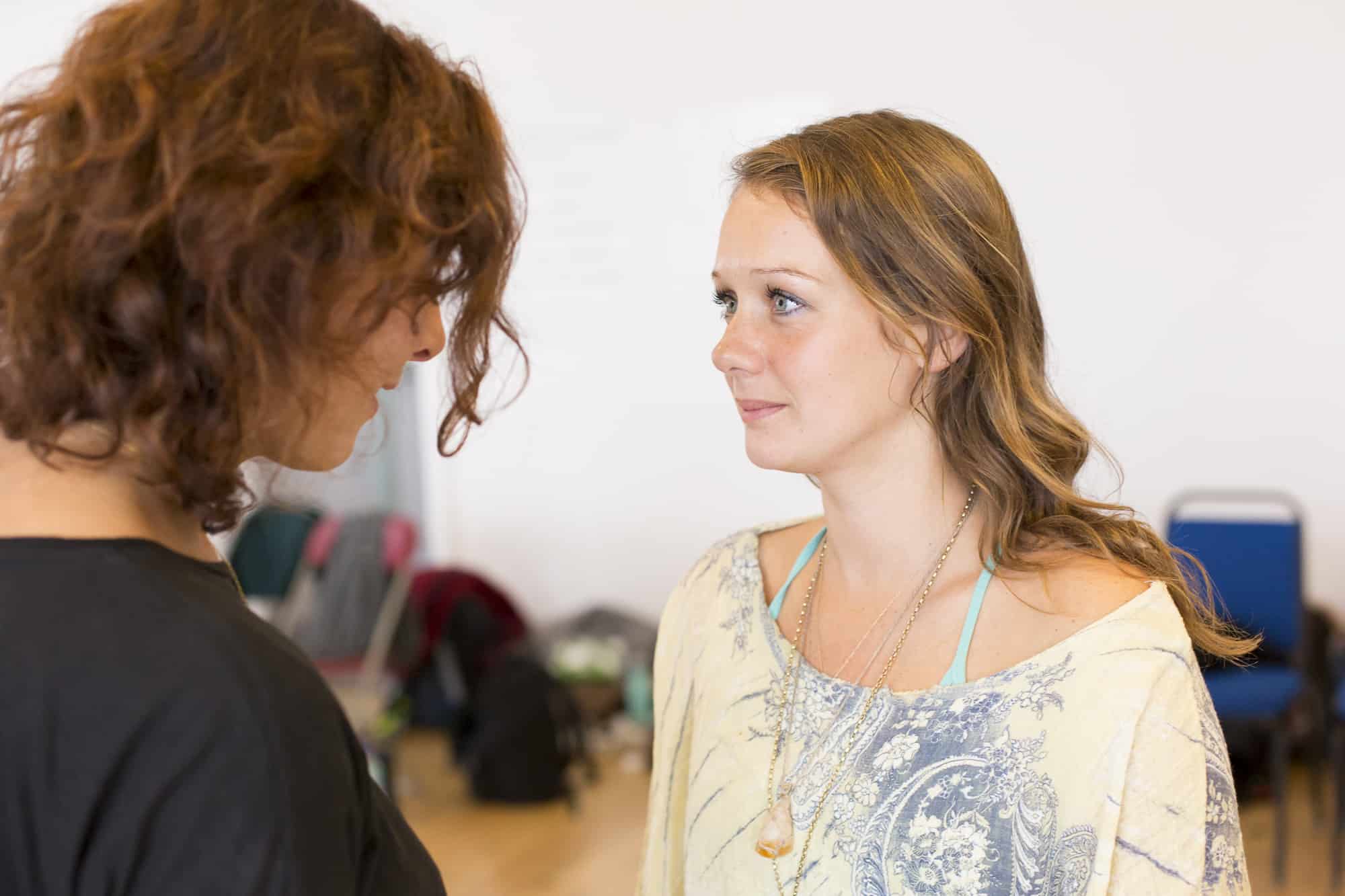Owning your experience is one of those standalone AR skills that can single-handedly radically transform the quality and depth of your relationships, if used skillfully. Owning your experience can have you reclaim all the ways you assert your opinions, perspectives, and assumptions and project them onto the fabric of reality, and find the source of your experience within yourself rather than outside of yourself.
The underlying premise of owning your experience is that everything that occurs in your field of awareness stems from a world-view and value system that is uniquely yours. Imagine that you and a friend are looking at a tree. You might both call it a tree and assume that you are both holding the same perception of the tree – it’s just a tree, and everyone knows what a tree is. But if you were each to be asked to describe the tree, the unique nature of your perspective starts to reveal itself.
You: “It’s bushy with a lot of leaves on the outer branches. The leaves are droopy and there are a lot of dead branches without any leaves. It looks a little scary, honestly.”
Your friend: “The trunk looks solid and smooth, with lots of roots showing through the dirt around the trunk. It looks like it would be fun to climb.”
If you were each asked to describe the feelings or memories this tree evoked in you, you would see even more of a difference in your perception of the tree between you and your friend. The tree is just a tree, and the same tree for everyone, but it arises in each person’s consciousness in a singularly unique way that is an expression of the unique complexities and nuances of each person’s path through life.
We can see from this example that there is really no such thing as being able to experience the absolute nature of reality outside of our own inherent perspectives. And yet we fall prey to this fallacy again and again, especially in relationship. Let’s take a look at how this shows up in the context of a relationship in an example.
Imagine a couple – John and Beth – are in the middle of a fight. At some point John says, “You just don’t care about me. All you care about is yourself.” This is a clear example of John not owning his experience. He is projecting his experience onto Beth’s reality, and describing her reality to her. Whenever we fall into the trap of describing someone else’s reality to them, it will almost always result in defensiveness… even if the description is accurate!
At the core of John’s experience is pain. Whenever someone is projecting his experience onto other people or onto reality, at the core of the projection you will almost always find either pain or fear. As John seeks to find the source of his pain, it may very well occur to him that the source is Beth’s lack of care for him. Even though Beth does, in fact, care for John, John’s actual, real experience is that she doesn’t. She can say all day long that she cares for him, and provide examples of her care, but if the underlying wound is deep and persistent, John may cling to his version of the story and it will seem perfectly real for him that Beth doesn’t care, and that’s why he’s feeling pain.
Owning your experience validates the authentic experience you’re having, even if it includes faulty information or assumptions. Let’s hear how John might share about his experience if he’s owning it:
“I’m feeling a lot of tightness and tension in my gut, and a part of me wants to hide and be small. I notice that I have a judgment that you don’t care about me, and it has me want to yell at you and make this your fault.”
John is giving Beth a clear window into his experience, letting her into his pain and how his pain manifests in his body and mind. He’s not blaming her, and he’s not making her the source of his experience. He’s owning his experience, and Beth feels closer to him and more compassion for him than she could if he made her at fault for his pain.
One easy way to distinguish if someone is owning his experience is if he’s describing it in a way that’s inarguable. “You don’t care about me” is clearly arguable, by the accused (“I do care about you!”) or by a bystander (“From what I’ve seen, she does care about you”).
“I have a judgment that you don’t care about me” is inarguable since that judgment is actually happening in the speaker’s authentic experience, and nobody can argue that the speaker’s experience is something other than exactly what he’s experiencing.
Let’s take a look at some examples and see if you can tell which ones are owned and which are unowned:
“I feel like you’re just saying that to make me feel better.”
“I wish you wouldn’t be so judgmental of them.”
“I think schools should allow more recess time to get kids outside.”
“I love how you always kiss me when I come home after work.”
Let’s break each of these down a little more to see what’s happening.
“I feel like you’re just saying that to make me feel better.” – A very common dead giveaway for when someone is trying to smuggle an unowned experience into language that sounds owned is by starting sentences with “I feel like” or “I feel that.” The statement “you’re just saying that to make me feel better” is not a feeling that can be felt at the sensory level – it’s an opinion that can be easily argued with.
There are a couple of ways to make this statement both owned, and presented as an opportunity to get shared reality about what’s really happening. The first way is to take clear ownership of the statement by starting the sentence with something like “I have an opinion that…” or “I have a story that…” or “I have a judgment that…” or even “It seems like…” All of these illustrate that you don’t know for sure, but that it occurs as a real possibility in your perception of what’s happening.
The second way of reconstructing this statement with AR principles is to add the phrase, “is that true?” to the end of the statement. This is one of the most useful, constructive, connective phrases you can say in relationship, and should be considered another power tool in your AR toolbag. “Is that true?” signifies to the other person that you’re curious about their perspective, that you don’t want to hold onto any false assumptions, and that you’re invested in the health and clarity of the connection.
Once you listen to the answer and get clear on the other person’s intentions and context for the behavior, you’ve arrived at a moment of shared reality, and can now orient your next steps to what’s actually happening and not only to your version of what’s happening.
“I wish you wouldn’t be so judgmental of them.” – This is another example that at first glance seems owned. The speaker didn’t say “Don’t be so judgemental of them,” which would be a clear-cut case of an unowned statement. But here again, the “I wish” is smuggling in an assumption that the other person is being overly judgmental. Owning your experience in this case is an opportunity to feel the impact within yourself of whatever is happening on the outside.
Maybe the person you’re speaking to is actually judging some other people harshly, and not owning her experience in doing so. What is the impact on you? Notice and speak to the impact, rather than the assumption of what is causing the impact: “I notice I feel very uncomfortable and a little scared when you talk about those people that way.” In this owned version, you are not blaming or judging the other person, and only sharing about your experience of the impact.
As a side note, we’ve noticed a common trap among our participants who are practicing the Own Your Experience skill, in which they accuse others of not owning their own experience, thereby shutting down the conversation or triggering the other person into defensiveness. We remind our participants that they are not the language police, and that they should instead stay in contact with their own experience and use that as a reference point for conversation. In a sense, telling someone else that they aren’t owning their experience is actually you not owning your experience yourself!
“I think schools should allow more recess time to get kids outside.” – This is clearly an opinion that is arguable, but saying “I think” at the beginning makes it clear that it’s your thought and not anyone else’s thought, so this is an owned statement. If the words “I think” hadn’t been spoken, this would be a perfect example of what we call a truth claim. A truth claim is when someone asserts that all of reality is a certain way, and that it occurs that way for everyone. “Everyone just wants to be happy,” “Kids are on their devices way too much these days,” and “Meditation is a great way to reduce stress” are all examples of truth claims.
Not all truth claims are unfounded, however, if they are considered inarguable. “Humans need oxygen to breathe” is indeed a truth claim, but has enough substantiated evidence to support it that it is essentially inarguable. But this set of truth claims is a tiny fraction of all the truth claims that are made by people. Even saying something like “Killing other people is wrong” can be argued with, depending on context.
Sometimes, we can forget to start our statements with phrases that make it clear that we are speaking from our own unique perspective. There’s still a way to make it owned! If you start out saying “Schools should allow more recess time to get kids outside,” you can add something like “in my experience” or “in my opinion” or even “based on some research I recently read” to the end of the statement to make it clear that it’s your perspective.
“I love how you always kiss me when I come home after work.” – This is another tricky one… if Person A says this to Person B, Person B might recall occasions when they didn’t kiss Person A, and could argue with the accuracy of the statement. Technically, this is an unowned statement, even though Person A is starting to own it by saying “I love.” The fully owned version would be something like “It seems like you kiss me every time when I come home, and I love it” or simply dropping the “always” and saying “I love it when you kiss me when I come home after work.”
The words “always” and “never” should be considered red-alert words that often indicate that the speaker is not owning their experience. Especially in relationship, things are hardly ever “always” or “never,” and are usually used to drive a point home that could be often be much more effectively conveyed by using owned language. A quick example:
“It’s so frustrating when you never take the garbage out!”
“When you don’t take the garbage out, I get frustrated!”
The first version makes a sweeping claim that is easily argued with, and is sure to the put the other person on the defensive. The second version puts the focus on the impact and makes the statement inarguable, paving the way for understanding and connection.
Another feature of the second version above is the way it separates the event from the impact of the event. This framing is an incredibly useful tool to use when sharing about the impact from something someone did or said. The basic format is this:
“When you said/did…, I feel/felt…”
We are clearly separating what happened from the impact of what happened, and making the impact owned. We often collapse the event and the impact of the event together, and ascribe the source of the impact to the event, and then demand that the event doesn’t happen again so that we don’t experience the impact, instead of taking ownership and responsibility for the impact.
In the example above, the speaker’s implicit context may be that she doesn’t feel respected when the garbage isn’t taken out. It doesn’t matter if the other person has a reasonable explanation for why the garbage wasn’t taken out… In her world, garbage not taken out equals disrespect, no matter what. The truth is, garbage not being taken out is simply garbage not being taken out, and it doesn’t mean anything in and of itself. The impact is as varied as there are people to feel impacted by it, and owning your experience by using the format above makes this very clear to everyone.
This format also has the benefit of identifying a specific moment in time and space when the impact happened, instead of generalizing it to say “always” or “never’ or even “recently” or “lately.”
As you become more proficient with owning your experience, you can start to reveal more and more of the inner layers of what is producing your experience. Once we shift the focus of seeking the source for our experience from outside ourselves to within ourselves, we can start to explore the fascinating territory of our inner selves and become ever more self-aware as a result.
As we start peeling back the layers that the practice of owning our experience has us coming into contact with, we begin to hone in on the real source of our thoughts, feelings, and perspectives. We often locate a belief or an interpretation of the world that we didn’t even know existed, that nevertheless has such an influence over our conscious experience. We can then articulate this core pattern or belief to people with whom we’re in relationship, providing an ever more intimate window into our most vulnerable selves, where we are most truly, deeply seen and felt.



